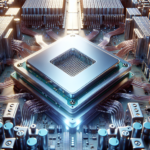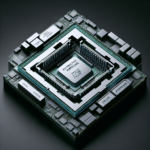Explaining the Use of CPUs in Quantum Computing

Explaining the Use of CPUs in Quantum Computing
Quantum computing is a rapidly evolving field that promises to revolutionize the way we process information. Unlike classical computers, which use bits to represent data as 0s or 1s, quantum computers use quantum bits, or qubits, which can represent both 0 and 1 simultaneously due to the principles of superposition and entanglement. However, the role of classical computing components, such as Central Processing Units (CPUs), remains crucial in the architecture and operation of quantum computers. This article delves into the intricate relationship between CPUs and quantum computing, exploring how these classical components are integrated into quantum systems and their significance in the overall computational process.
The Basics of Quantum Computing
What is Quantum Computing?
Quantum computing leverages the principles of quantum mechanics to perform computations that would be infeasible for classical computers. The fundamental unit of quantum computing is the qubit, which, unlike a classical bit, can exist in multiple states simultaneously. This property, known as superposition, allows quantum computers to process a vast amount of information in parallel.
Key Principles: Superposition and Entanglement
Two key principles underpin quantum computing:
- Superposition: A qubit can be in a state of 0, 1, or any quantum superposition of these states. This allows quantum computers to perform many calculations at once.
- Entanglement: When qubits become entangled, the state of one qubit is directly related to the state of another, no matter the distance between them. This phenomenon enables highly efficient information transfer and processing.
The Role of CPUs in Quantum Computing
Classical Control Systems
Despite the advanced capabilities of quantum computers, they still rely heavily on classical control systems to manage and execute quantum operations. CPUs play a vital role in these control systems by:
- Generating Control Signals: CPUs generate the precise control signals required to manipulate qubits. These signals include microwave pulses, laser beams, and magnetic fields, which are essential for performing quantum gates and operations.
- Data Processing: CPUs handle the classical data processing tasks that are necessary for quantum computations. This includes error correction, state preparation, and measurement interpretation.
- Algorithm Execution: Quantum algorithms often involve a combination of quantum and classical steps. CPUs execute the classical portions of these algorithms, coordinating with quantum processors to achieve the desired outcomes.
Hybrid Quantum-Classical Systems
Many current quantum computing systems are hybrid, meaning they combine quantum processors with classical CPUs to optimize performance. In these systems:
- Pre-Processing: CPUs perform pre-processing tasks, such as data encoding and initial state preparation, before passing the data to the quantum processor.
- Post-Processing: After quantum operations are completed, CPUs handle post-processing tasks, such as decoding the results and performing additional classical computations.
- Feedback Loops: CPUs are used to implement feedback loops that adjust quantum operations in real-time based on intermediate results, enhancing the accuracy and efficiency of quantum computations.
Challenges and Solutions
Integration Challenges
Integrating CPUs with quantum processors presents several challenges:
- Latency: The speed of classical CPUs can be a bottleneck in quantum computations, as the time taken to transfer data between classical and quantum components can introduce latency.
- Synchronization: Ensuring precise synchronization between classical and quantum operations is critical for accurate quantum computations.
- Error Correction: Quantum systems are highly susceptible to errors, and classical CPUs must perform complex error correction algorithms to maintain the integrity of quantum computations.
Technological Solutions
To address these challenges, researchers are developing various technological solutions:
- High-Speed Interconnects: Advanced interconnect technologies are being developed to reduce latency and improve data transfer speeds between classical and quantum components.
- Real-Time Control Systems: Specialized real-time control systems are being designed to ensure precise synchronization and coordination between classical CPUs and quantum processors.
- Enhanced Error Correction: Improved error correction algorithms and techniques are being implemented to enhance the reliability and accuracy of quantum computations.
Applications of CPUs in Quantum Computing
Quantum Simulation
One of the most promising applications of quantum computing is quantum simulation, which involves simulating complex quantum systems that are difficult to model using classical computers. CPUs play a crucial role in quantum simulation by:
- Preparing Initial States: CPUs prepare the initial states of the quantum system to be simulated, ensuring accurate and efficient simulations.
- Interpreting Results: After the quantum simulation is performed, CPUs interpret the results and perform additional classical computations to extract meaningful insights.
Optimization Problems
Quantum computers are well-suited for solving complex optimization problems, such as those found in logistics, finance, and machine learning. In these applications, CPUs are used to:
- Formulate Problems: CPUs formulate optimization problems in a way that can be efficiently solved by quantum algorithms.
- Hybrid Algorithms: Many optimization algorithms are hybrid, involving both quantum and classical steps. CPUs execute the classical portions of these algorithms, working in tandem with quantum processors.
Cryptography
Quantum computing has significant implications for cryptography, both in terms of breaking existing cryptographic protocols and developing new, quantum-resistant ones. CPUs are essential in this field for:
- Classical Cryptographic Operations: CPUs perform classical cryptographic operations, such as key generation and encryption, which are integrated with quantum protocols.
- Quantum Key Distribution (QKD): In QKD systems, CPUs manage the classical communication and error correction processes that are necessary for secure key distribution.
Future Directions
Advancements in Quantum Hardware
As quantum hardware continues to advance, the role of CPUs in quantum computing is expected to evolve. Future developments may include:
- Integrated Quantum-Classical Chips: Researchers are exploring the development of integrated chips that combine quantum processors and classical CPUs on a single substrate, reducing latency and improving performance.
- Specialized Quantum Control Units (QCUs): Specialized QCUs are being designed to handle the unique requirements of quantum control and error correction, enhancing the efficiency of quantum computations.
Software Innovations
In addition to hardware advancements, software innovations are crucial for optimizing the use of CPUs in quantum computing. These innovations may include:
- Advanced Quantum Algorithms: The development of advanced quantum algorithms that leverage the strengths of both quantum and classical computing will enhance the capabilities of hybrid systems.
- Improved Error Correction Techniques: New error correction techniques and protocols will improve the reliability and accuracy of quantum computations, reducing the burden on classical CPUs.
FAQ
What is the role of CPUs in quantum computing?
CPUs play a crucial role in quantum computing by generating control signals, handling data processing tasks, executing classical portions of quantum algorithms, and managing feedback loops. They are essential for the overall operation and coordination of quantum systems.
Why are hybrid quantum-classical systems important?
Hybrid quantum-classical systems combine the strengths of both quantum and classical computing to optimize performance. They allow for efficient pre-processing, post-processing, and real-time adjustments, enhancing the accuracy and efficiency of quantum computations.
What are the main challenges in integrating CPUs with quantum processors?
The main challenges include latency, synchronization, and error correction. Addressing these challenges requires advanced interconnect technologies, real-time control systems, and improved error correction algorithms.
How do CPUs contribute to quantum simulation?
CPUs contribute to quantum simulation by preparing initial states, interpreting results, and performing additional classical computations. They play a vital role in ensuring accurate and efficient simulations of complex quantum systems.
What are the future directions for the use of CPUs in quantum computing?
Future directions include the development of integrated quantum-classical chips, specialized Quantum Control Units (QCUs), advanced quantum algorithms, and improved error correction techniques. These advancements will enhance the capabilities and efficiency of quantum computing systems.
Conclusion
The integration of CPUs in quantum computing is a critical aspect of the current and future landscape of this revolutionary technology. While quantum processors handle the complex quantum operations, classical CPUs provide essential support through control signal generation, data processing, and algorithm execution. The challenges of latency, synchronization, and error correction are being addressed through technological advancements and innovative solutions. As quantum hardware and software continue to evolve, the role of CPUs will remain indispensable, driving the progress and realization of practical quantum computing applications. The synergy between classical and quantum computing holds the key to unlocking the full potential of this transformative technology.




